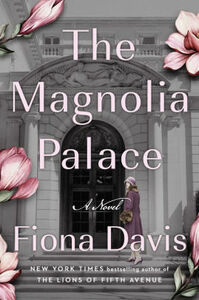Take a photo of a barcode or cover
adventurous
emotional
hopeful
mysterious
reflective
medium-paced
Plot or Character Driven:
A mix
Strong character development:
Yes
Loveable characters:
Yes
Diverse cast of characters:
Yes
Flaws of characters a main focus:
Yes
I had high hopes for this. Individually all the pieces were interesting to me: the Frick family, a murder, time shifting, a scavenger hunt for a hidden treasure, art history….
In the end though, we are not really part of the scavenger hunt, I didn’t realize the mystery was the mystery for quite a while because it doesn’t happen till towards the end of the book, and although there’s a lot of talk about art it’s basically just name checking. I felt the end was just too unrealistically tied together. It was fine, it passed the time, but I didn’t feel like it was a special read for me at all.
In the end though, we are not really part of the scavenger hunt, I didn’t realize the mystery was the mystery for quite a while because it doesn’t happen till towards the end of the book, and although there’s a lot of talk about art it’s basically just name checking. I felt the end was just too unrealistically tied together. It was fine, it passed the time, but I didn’t feel like it was a special read for me at all.
Overall, this book was mostly enjoyable. The characters and plot flowed and kept me reading through the pages at a comfortable pace.
Two drawbacks for me. The first, which seems to be a thing in most historical novels, is the assumption of the characters' intellect and maturity. They're almost always written as immature and lacking of common intelligence. It always annoys me. I don't understand this theme for characters in historical fiction.
The second is an editing issue. Now, had this just been one, maybe two, small instances? I probably wouldn't mention it. But, the lack of copy editing resulting in many inconsistencies drove me nuts and ended up taking enjoyment of the book away.
I will give two examples of them just to give you an idea of what I mean. I promise they aren't spoliers.spoilers.
After Helen's father passes away, it is discussed that the family will hold a viewing/memorial for him in their home with him in his casket. Then, the day of the service Helen asks if his remains are back yet. When I turned the page, she and Lillian are standing at his casket with him in it.
A other example is when Helen discusses visiting a certain someone in a nursing home. She tells Lillian and others she visits every couple weeks. However, once they are all at the nursing home, it is said that she visits monthly.
The book is riddled with all kinds of errors like this. I would think this book being published by a bigger publisher, there wouldn't be so many errors.
If you can overlook the inconsistencies, this is an enjoyable book with a great story. The way the author entwines two stories from two time periods into one was very enjoyable.
Two drawbacks for me. The first, which seems to be a thing in most historical novels, is the assumption of the characters' intellect and maturity. They're almost always written as immature and lacking of common intelligence. It always annoys me. I don't understand this theme for characters in historical fiction.
The second is an editing issue. Now, had this just been one, maybe two, small instances? I probably wouldn't mention it. But, the lack of copy editing resulting in many inconsistencies drove me nuts and ended up taking enjoyment of the book away.
I will give two examples of them just to give you an idea of what I mean. I promise they aren't spoliers.spoilers.
After Helen's father passes away, it is discussed that the family will hold a viewing/memorial for him in their home with him in his casket. Then, the day of the service Helen asks if his remains are back yet. When I turned the page, she and Lillian are standing at his casket with him in it.
A other example is when Helen discusses visiting a certain someone in a nursing home. She tells Lillian and others she visits every couple weeks. However, once they are all at the nursing home, it is said that she visits monthly.
The book is riddled with all kinds of errors like this. I would think this book being published by a bigger publisher, there wouldn't be so many errors.
If you can overlook the inconsistencies, this is an enjoyable book with a great story. The way the author entwines two stories from two time periods into one was very enjoyable.
This probably should have been a DNF, but I'm stubborn and my backlog on BOTM is long, so I powered through. I agree with a lot of other reviews I see, the 60s timeline seems superfluous, the actual mystery doesn't come up until the last third of the book, etc. But what really bothers me most about the book is just how truly unlikable and reprehensible ALL of the Fricks are (Helen included of course) and how they are consistently forgiven by the protagonist.
The Fricks are all flawed in unique ways(which isn't bad mind you, flaws are often what makes a character), but the ways in which the author and more namely the protagonist try to redeem them all fall terribly flat. Maybe it's because I have no sympathy for the inordinately wealthy, but I found it very hard to parse through their insufferable banter for which there is little to no consequence to their bad behavior.
Something else in particular that rubbed me the wrong way was the treatment of Joshua, more importantly what his presence served to the overall story. To be honest, Joshua was the most interesting character. His story and motivation as a young black archivist with the ambition to study and illuminate art specifically made by marginalized artists is compelling! And yet it feels like his story feels tacked on amongst the laborious and plentiful descriptions of the Frick House art (almost all notably produced by, you guessed it! White artists!)
Joshua's story is a story worth sharing, but it's inclusion in this particular book feels like more of an afterthought rather than a pertinent inclusion central to the stories core narrative. I also felt like Joshua's character served to redeem the white female characters of this novel (specifically, Helen may be a bullheaded, self-absorbed, rich, xenophobic narcissist, but at least she's not racist! *insert eyeroll*) more-so than actually offer a nuanced and honest depiction of black artists/historians.
The attempts at nuanced critique of race and class relations throughout the novel are clearly there, but overall, I feel like this book puts more work into glorifying the opulence and excess of the American bourgeoise than any of its efforts to critique or admonish it.
The Fricks are all flawed in unique ways(which isn't bad mind you, flaws are often what makes a character), but the ways in which the author and more namely the protagonist try to redeem them all fall terribly flat. Maybe it's because I have no sympathy for the inordinately wealthy, but I found it very hard to parse through their insufferable banter for which there is little to no consequence to their bad behavior.
Something else in particular that rubbed me the wrong way was the treatment of Joshua, more importantly what his presence served to the overall story. To be honest, Joshua was the most interesting character. His story and motivation as a young black archivist with the ambition to study and illuminate art specifically made by marginalized artists is compelling! And yet it feels like his story feels tacked on amongst the laborious and plentiful descriptions of the Frick House art (almost all notably produced by, you guessed it! White artists!)
Joshua's story is a story worth sharing, but it's inclusion in this particular book feels like more of an afterthought rather than a pertinent inclusion central to the stories core narrative. I also felt like Joshua's character served to redeem the white female characters of this novel (specifically, Helen may be a bullheaded, self-absorbed, rich, xenophobic narcissist, but at least she's not racist! *insert eyeroll*) more-so than actually offer a nuanced and honest depiction of black artists/historians.
The attempts at nuanced critique of race and class relations throughout the novel are clearly there, but overall, I feel like this book puts more work into glorifying the opulence and excess of the American bourgeoise than any of its efforts to critique or admonish it.
So an 80-year-old remembers stamp on a letter from 1931 and the first city “Pine” name on the map is the right one?
This book felt very meh to me and the whole books historical fiction plot was a structure of convenient coincidences.
This book felt very meh to me and the whole books historical fiction plot was a structure of convenient coincidences.
informative
lighthearted
mysterious
medium-paced
Plot or Character Driven:
A mix
Strong character development:
Yes
Loveable characters:
Complicated
Diverse cast of characters:
Yes
Flaws of characters a main focus:
No
informative
mysterious
medium-paced
Plot or Character Driven:
A mix
Strong character development:
Yes
Diverse cast of characters:
No
Fiona Davis writes historical fiction about iconic New York landmarks, and I enjoy her stories so much. This book about the Frick Collection was an interesting read and made me so curious about Henry Clay Frick, his daughter Helen, and the art they both loved so much.
I obtained this book first via Netgalley - and I loved it! The characters are well developed. I enjoyed reading the dual time line which incorporated the people from the earlier time into the later time. I also learned a lot about the Frick collection which I'll now go research a bit more! I appreciated being able to read this story and knowing a little more about that time period.
Loved loved loved. Especially loved the authors note at the end! Make sure to read it if you choose to read this book!



